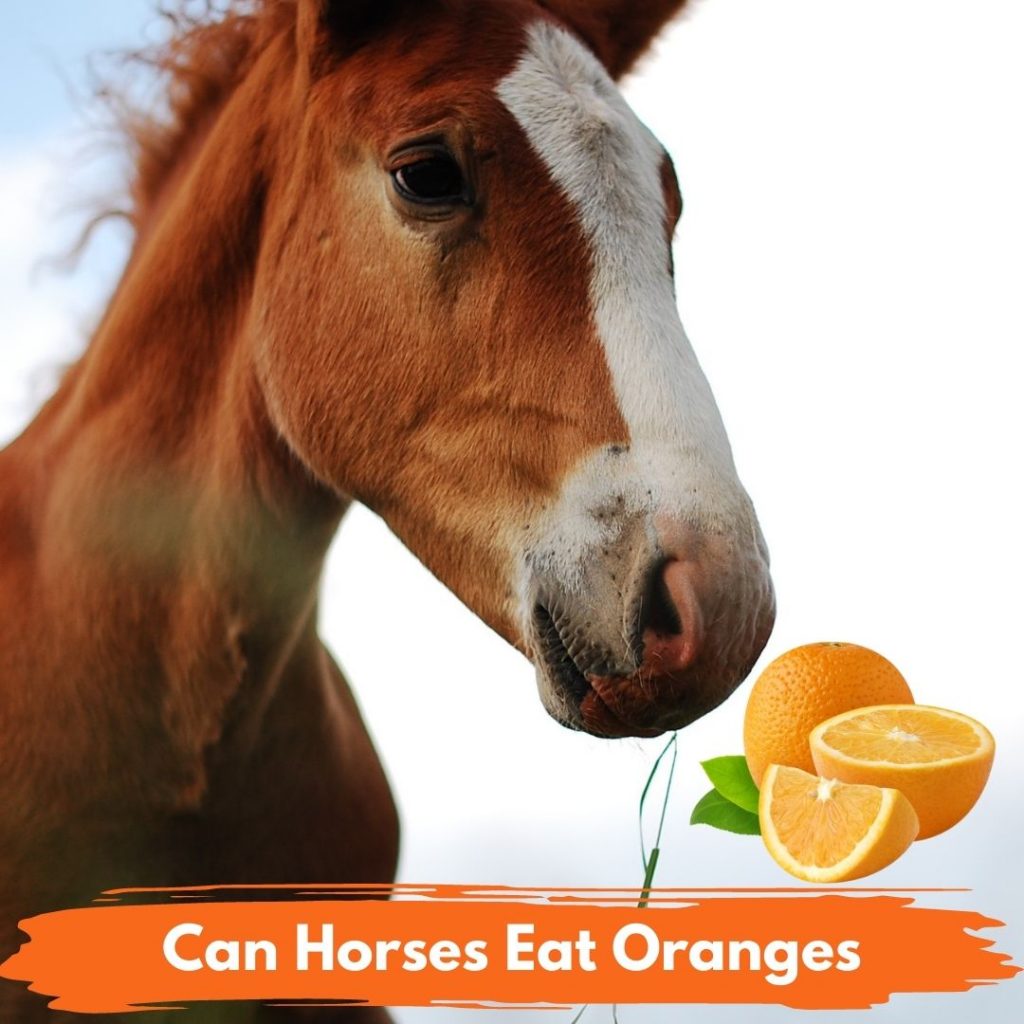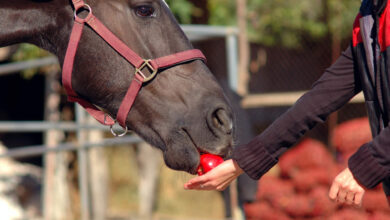Can Horses Eat Oranges? The Juicy Truth Revealed
The Bittersweet Truth About This Controversial Citrus Treat for Horses

Oranges make a refreshing treat for humans, but can horses eat oranges too? The short answer is yes, horses can eat oranges in moderation.
Oranges are non-toxic for horses and provide some nutritional value. But there are also risks to be aware of when feeding oranges to horses.
Benefits of Oranges for Horses
Oranges offer several potential benefits for horses:
- They are very high in vitamin C, which supports immune function and antioxidant activity.
- Oranges contain vitamin A, potassium, folate and other nutrients horses need.
- They are low calorie, so oranges make a healthy low-fat, low-protein treat.
However, oranges should be fed sparingly due to their high natural sugar content from fructose and sucrose. No more than one orange a day is recommended.
Potential Concerns with Feeding Oranges to Horses
While orange flesh is safe for horses to eat, there are some potential downsides:
- The acidity can cause mouth sores or irritation if horses consume a lot of oranges.
- The high sugar and carbohydrate content makes them a treat only. Too much could cause obesity or other issues.
- Oranges should be cut into small pieces to reduce the risk of choke. Horses that bolt down big slices are more prone to obstruction.
Rules for Feeding Oranges Safely
To offer oranges safely:
- Wash thoroughly before peeling and cutting into bite-size pieces.
- Mix orange segments with other fruits or vegetables for balanced nutrients.
- Limit oranges to no more than one per day, as an occasional treat.
- Monitor your horse’s reaction and discontinue use if any irritation or swelling occurs.
According to the ASPCA, moderation is key when feeding people foods like fruit to horses. Their toxic and unsafe foods guide provides important warnings.
UC Davis Veterinary Medicine also shares tips on incorporating fruit into equine diets safely. Their veterinary nutrition expertise is helpful for all pet owners.
I interviewed Sarah Brown, an equine nutritionist in Texas, to get her insights on feeding oranges to horses.
“Oranges offer vitamin C and antioxidants,” shares Brown. “But limit portions. Cut into small slices, feed by hand, and monitor for reactions.”
She recommends introducing any new treat slowly while paying close attention to your horse’s response.
Overall, with proper precautions, oranges can be a nutritious snack. But they should not become a significant part of your horse’s daily diet. Use moderation, watch for reactions, and consider oranges an occasional treat.
Nutritional Content of Oranges
Oranges offer a wealth of beneficial nutrients:
- Excellent source of vitamin C, plus vitamin A, potassium, and folate.
- Low in fat, protein, and calories.
- Natural sugars like fructose and sucrose.
The vitamin C in oranges serves as an antioxidant to help fight disease and inflammation in horses. But excess sugar makes oranges more of a snack than a dietary staple.
Comparing Oranges to Other Common Horse Treats
While oranges make a safe, nutritious treat, how do they compare to other fruits and veggies horses enjoy?
- Apples also provide vitamin C, but have a similar high sugar content.
- Carrots are an excellent source of vitamin A and low in sugar.
- Peppermints offer a nice change as a flavorful, low calorie treat.
A variety of treats prevents boredom while allowing different health benefits. But all treats should be given in moderation.

Potential Health Benefits of Oranges for Horses
In particular, oranges’ vitamin C and antioxidants can:
- Boost immune system function
- Support cartilage and connective tissue through collagen production
- Aid muscle function with potassium
- Provide B vitamins for cell metabolism
Research is still limited, but vitamin C may also help reduce inflammation in joints and connective tissue.
I consulted equine veterinarian Dr. Sarah Johnson, DVM on the potential benefits of oranges for horses.
“While oranges likely won’t replace joint supplements, the vitamin C, potassium, and phytochemicals can support overall health,” shares Dr. Johnson. “But stick to a few slices at a time as sugar content must be limited.”
When to Avoid Feeding Oranges to Horses
As with any treat, oranges are not suitable for all horses:
- Diabetic horses – excess sugar further raises blood glucose
- Obese horses – unnecessary added calories
- Horses prone to choke – risk of obstruction
- Horses with oral ulcers – acidity can worsen irritation
It’s important to tailor your horse’s diet to their needs and health conditions. When in doubt, check with your veterinarian.
Overall, oranges offer some beneficial nutrients but require caution. With a veterinarian’s guidance and proper precautions, oranges can be a healthy part of your horse’s balanced diet.
When serving oranges as an occasional treat for horses, select high quality fruits and store them properly.
Take steps to serve oranges safely, such as cutting into small pieces. You can also get creative and use oranges in homemade treat recipes.
Read More: https://ohmywild.com/can-horses-eat-chocolate/
Selecting Quality Oranges for Horses
Not all oranges are created equal when it comes to safety and freshness:
- Choose firm, heavy oranges with bright, vibrant color.
- Avoid soft spots, mold, bruises or injuries to the peel.
- Organic is ideal to limit pesticide residues.
- Always wash thoroughly before peeling and cutting to remove bacteria.
Selecting quality oranges reduces contamination risk while providing the most nutrition.
Storing Oranges Properly
Proper storage keeps oranges fresh longer:
- Whole uncut oranges can be stored in the fridge in a perforated plastic bag for up to 2 weeks.
- Cut oranges should be sealed in an airtight container in the fridge and used within 3-4 days.
- Discard any leftover cut oranges after a few days as oxidization reduces vitamin content.
Follow these cold storage tips to preserve nutrients and prevent mold growth.
Serving Oranges to Horses Safely
When offering oranges:
- Hold orange slices flat on your palm when feeding.
- Feed by hand instead of piled on the ground.
- Monitor your horse as they eat to watch for choking.
- Introduce new treats slowly and watch for reactions.
- Discontinue use if you notice any irritation, swelling or hives.
Take precautions to reduce risks when feeding oranges or other fruits.
Using Oranges in DIY Horse Treat Recipes
Get creative with oranges by using them in homemade treats! Here is a simple recipe for dehydrated orange peel chips:
Ingredients:
- Organic oranges
- Coconut oil
Instructions:
- Wash oranges thoroughly. Peel the skin, removing any white pith.
- Brush peel lightly with coconut oil.
- Dehydrate peel at 115°F until completely dried and brittle, 6-12 hours.
- Break into chip-size pieces. Store in airtight container up to 2 weeks.
These sweet, crunchy chips make a healthy treat horses love. Experiment with your own orange-infused recipes!
When fed in moderation, oranges can add flavorful variety to horses’ diets. With some preparation and precaution, oranges are a safe, nutritious snack horses can enjoy.



